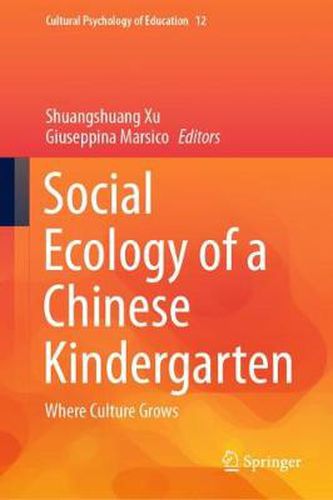Readings Newsletter
Become a Readings Member to make your shopping experience even easier.
Sign in or sign up for free!
You’re not far away from qualifying for FREE standard shipping within Australia
You’ve qualified for FREE standard shipping within Australia
The cart is loading…






This title is printed to order. This book may have been self-published. If so, we cannot guarantee the quality of the content. In the main most books will have gone through the editing process however some may not. We therefore suggest that you be aware of this before ordering this book. If in doubt check either the author or publisher’s details as we are unable to accept any returns unless they are faulty. Please contact us if you have any questions.
This book is the outcome of a joint collaboration between East China Normal University and the University of Luxembourg, initiated by the Center of Ideas for the Basic Education of the Future (IBEF), and focuses on kindergartens in China from a cultural psychology perspective.
By coupling young scholars from diverse cultural backgrounds as research tandems, this book uses an innovative methodological method to reveal a deeply immersing research perspective of the often complicated issues in the Chinese social reality, where long historical tradition and strong motivation for a modernized future are fused together and continuously evolve itself into a vibrant and intricate landscape. Meanings and values consciously or unconsciously promoted and conducted in the kindergarten are semiotic devices and they mediate children’s and educator’s daily behaviours and activities, which are constantly navigating among different social institutions and crossing the border of kindergarten.
The book discusses the process of children’s socialization in the kindergarten from different angles such as cultural objects, moral education, conflict negotiation, children’s drawing analysis and the role of Lego in numeracy development. It also provides an overview of basic educational needs in Chinese kindergartens as well as three commentaries to provide background information and to add a reflective angle for the readers. By reading the book, readers will hopefully go through a constantly transforming process between familiarizing and de-familiarizing along with the research tandem and develop their own understanding of the complex landscape of the Chinese kindergarten and its children as developing subjects constantly living and transcending the context.
$9.00 standard shipping within Australia
FREE standard shipping within Australia for orders over $100.00
Express & International shipping calculated at checkout
This title is printed to order. This book may have been self-published. If so, we cannot guarantee the quality of the content. In the main most books will have gone through the editing process however some may not. We therefore suggest that you be aware of this before ordering this book. If in doubt check either the author or publisher’s details as we are unable to accept any returns unless they are faulty. Please contact us if you have any questions.
This book is the outcome of a joint collaboration between East China Normal University and the University of Luxembourg, initiated by the Center of Ideas for the Basic Education of the Future (IBEF), and focuses on kindergartens in China from a cultural psychology perspective.
By coupling young scholars from diverse cultural backgrounds as research tandems, this book uses an innovative methodological method to reveal a deeply immersing research perspective of the often complicated issues in the Chinese social reality, where long historical tradition and strong motivation for a modernized future are fused together and continuously evolve itself into a vibrant and intricate landscape. Meanings and values consciously or unconsciously promoted and conducted in the kindergarten are semiotic devices and they mediate children’s and educator’s daily behaviours and activities, which are constantly navigating among different social institutions and crossing the border of kindergarten.
The book discusses the process of children’s socialization in the kindergarten from different angles such as cultural objects, moral education, conflict negotiation, children’s drawing analysis and the role of Lego in numeracy development. It also provides an overview of basic educational needs in Chinese kindergartens as well as three commentaries to provide background information and to add a reflective angle for the readers. By reading the book, readers will hopefully go through a constantly transforming process between familiarizing and de-familiarizing along with the research tandem and develop their own understanding of the complex landscape of the Chinese kindergarten and its children as developing subjects constantly living and transcending the context.